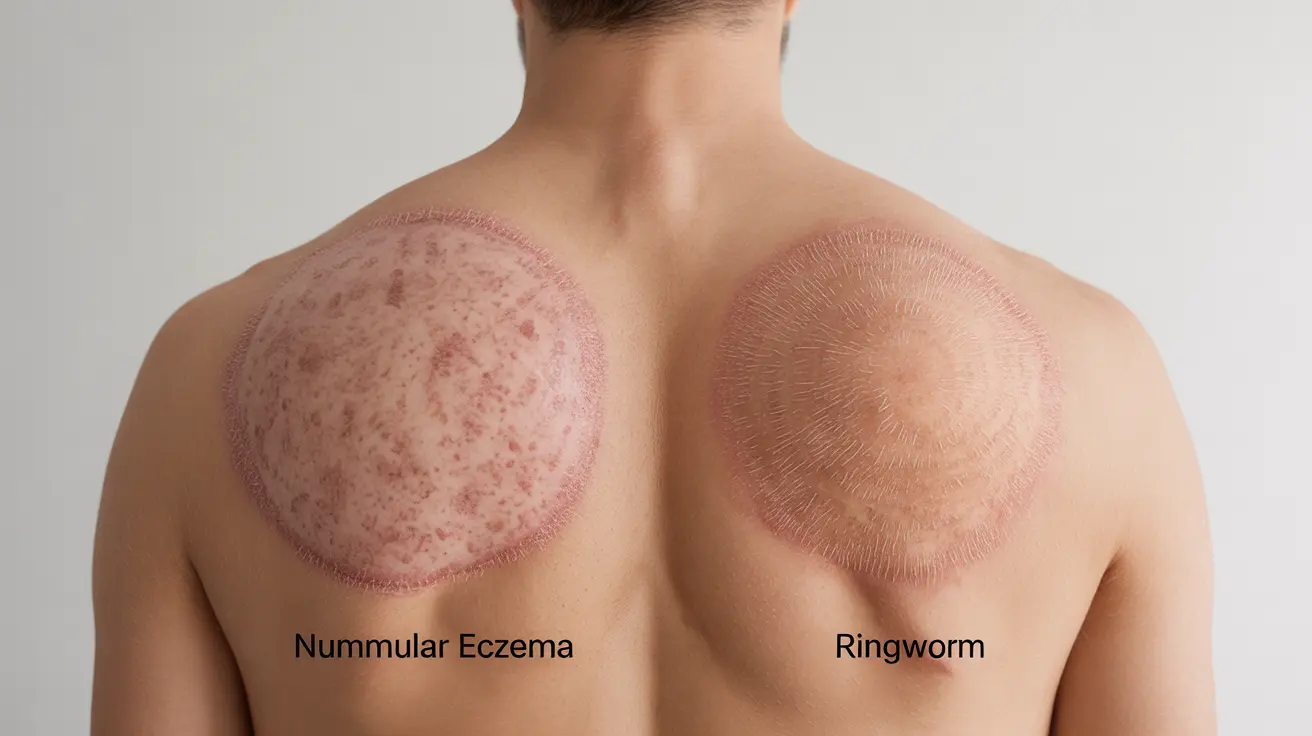When you notice round, itchy patches on your skin, it can be challenging to determine whether you're dealing with nummular eczema or ringworm. While these conditions may look similar at first glance, they have distinct characteristics and require different treatment approaches. Understanding these differences is crucial for proper diagnosis and effective management of your skin condition.
Understanding Nummular Eczema and Ringworm
Nummular eczema and ringworm are two distinct skin conditions that can cause circular lesions on the skin. While they may appear similar, they have different causes and characteristics that set them apart.
Characteristics of Nummular Eczema
Nummular eczema, also known as discoid eczema, presents as coin-shaped patches that are often:
- Well-defined, circular or oval lesions
- Dry, scaly, and crusty in appearance
- Intensely itchy
- Varying in size from small coins to large patches
- Sometimes oozing or becoming infected
- Most common on arms, legs, and torso
Characteristics of Ringworm
Ringworm, despite its name, is not caused by a worm but by a fungal infection. Its distinctive features include:
- Circular lesions with raised, scaly borders
- Clearer skin in the center, creating a ring-like appearance
- Mild to moderate itching
- Gradual expansion of the affected area
- Can appear anywhere on the body
- Often accompanied by redness and inflammation
Diagnostic Approaches
Healthcare providers use several methods to differentiate between these conditions:
Physical Examination
A doctor will carefully examine the affected areas, noting:
- The pattern and distribution of lesions
- The presence or absence of central clearing
- The texture and appearance of the affected skin
- Any additional symptoms or related conditions
Diagnostic Tests
To confirm the diagnosis, medical professionals may perform:
- Skin scraping and microscopic examination for fungal infections
- Wood's lamp examination
- Skin biopsy in unclear cases
- KOH test for suspected ringworm
Treatment Strategies
Managing Nummular Eczema
Treatment for nummular eczema typically involves:
- Topical corticosteroids to reduce inflammation
- Moisturizers to prevent dryness
- Wet wrap therapy for severe cases
- Oral antihistamines for itching
- Phototherapy in some cases
- Identifying and avoiding triggers
Treating Ringworm
Ringworm treatment usually includes:
- Antifungal creams, ointments, or powders
- Oral antifungal medications for severe cases
- Regular cleaning and drying of affected areas
- Treatment of infected items and surfaces
- Prevention measures to avoid spread
Prevention and Management
To prevent and manage both conditions effectively:
- Keep skin clean and dry
- Avoid sharing personal items
- Use gentle, fragrance-free skincare products
- Maintain good hygiene practices
- Monitor for early signs of recurrence
- Follow prescribed treatment plans consistently
Frequently Asked Questions
What are the main differences in symptoms between nummular eczema and ringworm?
Nummular eczema typically presents as coin-shaped, extremely itchy patches that may ooze and don't usually have clearing in the center. Ringworm has a characteristic ring-like appearance with raised, scaly borders and clearer skin in the middle, accompanied by less intense itching.
How can a doctor accurately diagnose whether a round itchy rash is nummular eczema or ringworm?
Doctors use physical examination, skin scrapings, KOH tests, and sometimes Wood's lamp examination or skin biopsies to differentiate between the conditions. The pattern, appearance, and laboratory results help confirm the diagnosis.
Is nummular eczema contagious like ringworm, and how does each condition spread?
Nummular eczema is not contagious and cannot spread from person to person. Ringworm, however, is highly contagious and can spread through direct contact with infected people, animals, or contaminated items.
What are the most effective treatments for managing nummular eczema compared to ringworm?
Nummular eczema is treated with topical corticosteroids, moisturizers, and sometimes oral medications or phototherapy. Ringworm requires antifungal medications, either topical or oral, depending on severity.
How can I prevent ringworm infections and reduce flare-ups of nummular eczema?
Prevent ringworm by avoiding contact with infected individuals or animals and maintaining good hygiene. Reduce nummular eczema flare-ups by keeping skin moisturized, avoiding triggers, and following a proper skincare routine.




